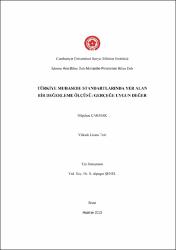| dc.contributor.advisor | Şenel, Said Alpagut | |
| dc.contributor.author | Çakmak, Bilgehan | |
| dc.date.accessioned | 2022-04-28T08:57:34Z | |
| dc.date.available | 2022-04-28T08:57:34Z | |
| dc.date.issued | 2013 | tr |
| dc.date.submitted | 2013-06-04 | |
| dc.identifier.other | ii, 142 sayfa | |
| dc.identifier.uri | https://hdl.handle.net/20.500.12418/12508 | |
| dc.description.abstract | Muhasebe bilimi açısından değerleme, bir işletmenin finansal tablo unsurlarının değerini belirleme işlemidir. Finansal tablo unsurlarının belli bir tarihteki değerini tespit etmek amacıyla farklı değerleme yöntemleri kullanılır.
Finansal tabloların hazırlanmasında tarihi maliyet değerleri esas olup; tarihi maliyeti esas alan finansal tablolar, uzun süre teorisyenler, akademisyenler ve işletme uygulamacıları tarafından değişik yönlerden eleştirilmiştir. Bu eleştirilerin sonucu olarak, tarihi maliyet yerine, gerçeğe uygun değerin kullanılması teşvik edilmiştir. Gerçeğe uygun değer, belirli varlık ve yükümlülüklerin cari piyasa değeridir. Bu ölçütün kullanımı ile finansal tabloların değeri artacak ve gerçeğe daha uygun olacaktır.
Bu çalışmanın amacı işletmeler ve finansal bilgi kullanıcıları açısından değerlemenin önemini vurgulamaktır. Birçok değerleme yöntemi ele alınmış ve neden gerçeğe uygun değer yöntemi ile değerleme yapılması gerektiği anlatılmıştır. Türkiye Muhasebe Standartlarında yer alan gerçeğe uygun değer teorik olarak anlatılmıştır. | tr |
| dc.description.abstract | Valuation in terms of accounting science is the process of assessing the value of financial statement components of an enterprise. Different valuation methods are used to determine the value of financial statement components on a certain date.
Historical cost-based financial statements has been the center of significant controversy among theoreticians, academicians, and business practitioners in corporate for a long time form different view. As a result of the discussion, fair value was encouraged to use instead of historical cost. Fair value accounting is the practice of accounting that values certain assets and liabilities at their current market value. Using these criteria, value of the financial statements will be increased and more realistic.
The goal of this study is to emphasize on the importance of valuation in term of enterprise and the users of financial information. Many value methods are dealt with and requirement of why the value is assessed with fair value technique is explained. Fair value in Turkish Accounting Standards is explained theoretically. | tr |
| dc.language.iso | tur | tr |
| dc.publisher | Sivas Cumhuriyet Üniversitesi-Sosyal Bilimler Enstitüsü | tr |
| dc.rights | info:eu-repo/semantics/openAccess | tr |
| dc.subject | Uluslararası Muhasebe Standartları | tr |
| dc.subject | Değerleme Yöntemleri | tr |
| dc.subject | Değer | tr |
| dc.subject | Gerçeğe Uygun Değer | tr |
| dc.title | Türkiye Muhasebe Standartlarında Yer Alan Bir Değerleme Ölçüsü: Gerçeğe Uygun Değer | tr |
| dc.type | masterThesis | tr |
| dc.contributor.department | Sosyal Bilimler Enstitüsü | tr |
| dc.relation.publicationcategory | Tez | tr |















